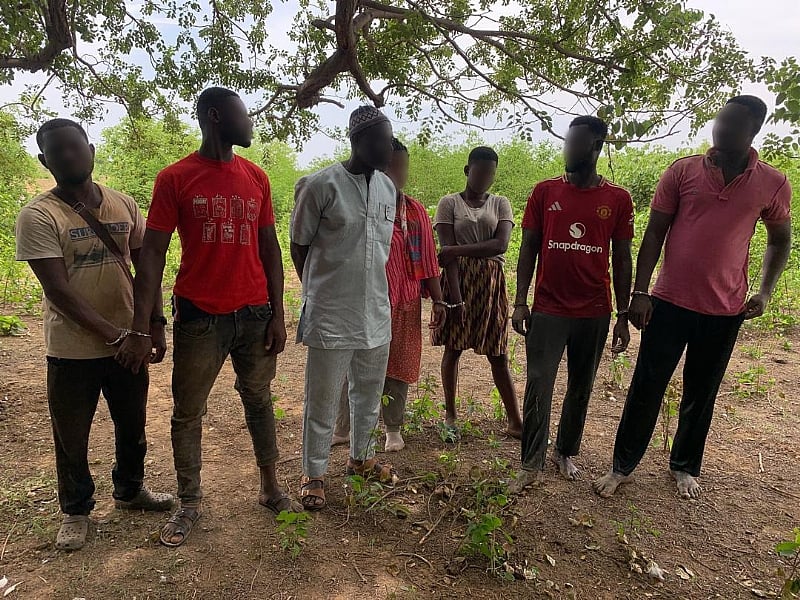The fight against illegal mining, locally known as “galamsey,” in Ghana continues with the arrest of seven individuals in the Upper West Region. A joint security operation, spearheaded by the Upper West Regional Police Command, targeted an illegal mining site along the Black Volta River in Chiantanga, Wa West District. The operation, conducted on April 10, 2025, resulted in the apprehension of seven suspects: Sabugu Razak, Ibrahim Zuberu, Alex Amedzake, John Cobblah, Promise Dufe, Angelina Akpese, and Rebecca Tumawu. The arrests highlight the ongoing efforts by authorities to combat the pervasive issue of unregulated mining that poses significant threats to Ghana’s water resources and delicate ecosystems. This specific operation is part of a broader crackdown on illegal mining activities within the Upper West Region. The Black Volta River, a critical water source for the region, has been particularly vulnerable to the environmental degradation caused by galamsey.
The operation not only led to the arrest of the seven suspects but also the confiscation of various equipment used in the illegal mining operation. Among the seized items were ten Changfang machines, commonly employed in alluvial mining, a process that involves extracting minerals from riverbeds and surrounding areas. This type of mining is particularly damaging to river ecosystems, disrupting water flow, destroying habitats, and contaminating the water with heavy metals and other pollutants. Authorities also seized two unregistered tricycles and two registered motorcycles bearing the registration numbers M-24-NR 6010 and M-23-UW 4413. Two additional unregistered motorcycles were also impounded. The discovery of six student mattresses at the site suggests that the suspects had established a semi-permanent presence, potentially residing at the location during their mining activities.
The arrested individuals are currently being held in police custody as investigations continue. They are expected to be formally charged and brought before a court in the coming days. The regional police commander, DCOP Nii Danto Offei Lomotey, issued a statement reaffirming the command’s unwavering commitment to eradicating illegal mining within the region. The statement serves as a strong message to those involved in galamsey that law enforcement agencies are actively pursuing them and working to protect the region’s valuable natural resources. The successful operation in Chiantanga demonstrates the ongoing commitment and operational capabilities of the police in tackling illegal mining.
The implications of galamsey extend beyond environmental damage. The illegal activities often involve complex networks of individuals, including financiers, equipment suppliers, and miners. The presence of student mattresses at this site raises questions about the potential exploitation of vulnerable individuals, particularly students, who may be lured into illegal mining due to economic hardship or other factors. The fight against galamsey requires a multi-pronged approach involving not only law enforcement operations but also addressing the underlying socioeconomic factors that drive individuals towards these illegal activities. Creating alternative livelihood opportunities and providing education on the environmental and social consequences of illegal mining are crucial steps to address the root causes of the problem.
The Black Volta River, a significant tributary of the Volta River, plays a vital role in the lives of numerous communities in the Upper West Region, providing water for drinking, agriculture, and other essential activities. The continuous assault on the river by illegal miners poses severe risks to water security and the overall health of the ecosystem. Pollution from mining operations, including heavy metal contamination and sedimentation, can render the water unsafe for consumption and harm aquatic life. The destruction of riverbanks and vegetation further exacerbates the problem, leading to increased erosion and flooding. Protecting the Black Volta River and other vital water sources in the region is paramount to preserving the livelihoods and well-being of the communities that depend on them.
The recent operation in Chiantanga is just one piece of a larger puzzle in the ongoing battle against illegal mining in Ghana. Authorities have indicated that similar operations are planned in the future, signaling their determination to tackle this persistent challenge head-on. The effectiveness of these efforts, however, will depend on sustained commitment and a multifaceted approach that involves not just law enforcement but also collaboration with local communities, education and awareness campaigns, and robust environmental regulations. The environmental and social consequences of galamsey are far-reaching, and addressing this issue requires a comprehensive strategy that takes into account the complexities of the problem and the needs of the affected communities. Ultimately, the goal is to not only stop illegal mining but also to create sustainable alternatives that protect both the environment and the livelihoods of the people.














